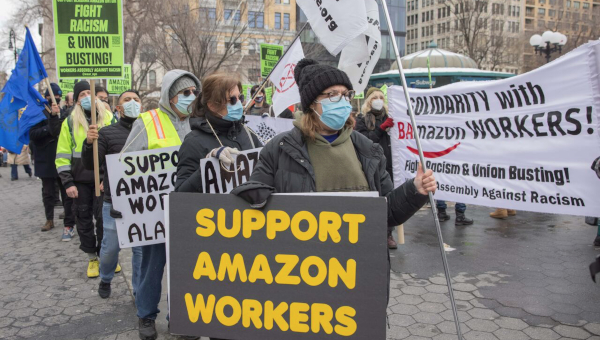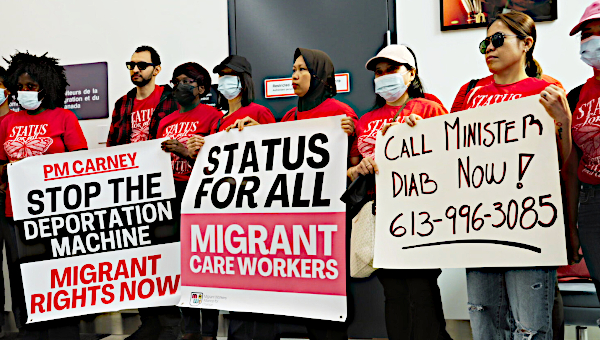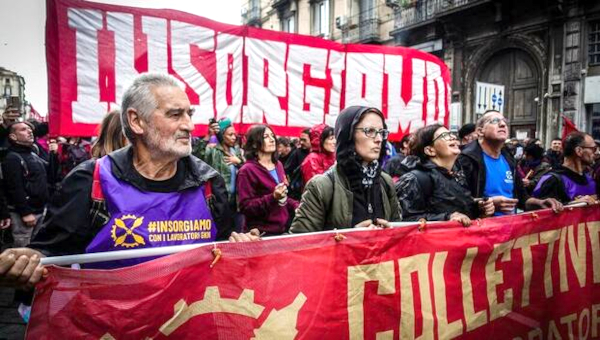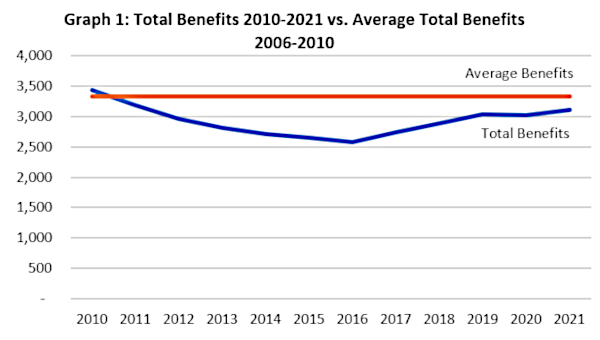Strike by Five Thousand B.C. Grocery Workers Narrowly Averted
Five thousand workers at one of British Columbia’s largest grocery chains, the Overwaitea Food Group (OFG), have ended a difficult round of collective bargaining by voting in favour of a new agreement with a 75% majority.
In late June, workers voted by 58 per cent to reject a proposed agreement recommended by their union bargaining committee. The union, United Food and Commercial Workers (UFCW), then announced a strike to begin on June 28. That was blocked when the company applied for a mediation process that was compulsory, under law, for the union. A revised proposal was then mediated/negotiated and put to a second vote on July 6 and 7.
Two tier wages at issue
The workers are employed at 27 of OFG’s Save On Foods supermarkets in the greater Vancouver region of British Columbia. OFG is part of the business conglomerate of local billionaire James Pattison. Negotiations for close to 20,000 other workers at grocery chains throughout the province will now proceed, notably at Safeway, the Loblaws-owned Superstore and its budget spin-offs, and Save On stores elsewhere in British Columbia. The agreement at the OFG-owned Price Smart budget chain expires in 2010.
Save On workers set three goals for their bargaining committee – a hefty wage increase, elimination of a two-tier wage scale, and an end to the conversion of Save On stores to the lower-wage Price Smart. Among the reasons cited for rejection of the first proposal were that it gave better wage increases to higher-paid workers, it maintained the two-tier wage setup, and it offered too little protection against Price Smart conversions.
The new agreement is for five years. The two-tier pay scale, known as Grids A and B, remains in place. All current employees will receive a $1 per hour wage increase, then a fifty cent increase for each of the following four years.
The minimum rate for Grid B will immediately rise to $9.75 per hour for the most common job classification and then stay there for the life of the agreement. (“Service clerks” start at $9 per hour, but receive better social benefits than those starting at $9.75). The maximum rate for Grid B will rise from about $12 to $15.60. The number of steps to reach the top increases, to 7,080 hours. This could be reached within four years if the part-time employee works the extra hours, equivalent to full-time, that many are offered.
A new hire at $9 or $9.75 per hour moves to $10.10 after 520 hours of work.
The minimum rate for Grid A will rise in the fourth and fifth years of the agreement, from $15.20 to $15.80; the top rate will go from $22.50 to $23.70. Reaching the top rate will take a full-time employee two and a half years.
The collective agreement provides for a worker to move from Grid B to Grid A, according to seniority and job openings.
The $1 per hour increase is “off-grid,” as are the annual 50 cent increases. More modest increases are introduced to the “grid” (wage scale). As one worker commented in an e-mail forum, “I have to say that I’m just not terribly impressed by off the grid wage increases. Like signing a bonus, they really don’t do much to improve the actual contract upon which future contracts will be negotiated. If they don’t do the same thing on the next deal, those people who are a buck and a half above the grid…could essentially have their wages frozen until the next grid catches up to them.”
Concerning the future of Save On outlets, the new agreement limits to six the number of stores in B.C. that can be converted to Price Smart or an equivalent. Improvements to job security were won for workers facing store closings or conversions.
Company/government assault on grocery workers
The two-tier wage scale was imposed by the grocery chains during the late 1990s as they launched a coordinated attack on wages and working conditions. Strikes at Safeway in British Columbia in 1996 and later in Alberta did not stop the onslaught. The doors were opened to concessions imposed on the whole industry.
As a result of the company offensive, well-paid, full time jobs went into decline, to be replaced by poorly-paid, part-time positions. Today at OFG, some 70 per cent of the jobs are Grid B.
Several workers interviewed for this article believe that the ratio of full-time jobs to part time at Save On will slowly rise because of improvements in the new agreement. The collective agreement provides for a 50-50 ratio of full to part time jobs, except for new stores. These can operate with 25 (full-time)-75 (part-time) for seven years.
A sign of how ruthless the grocery chains could be without a unionized workforce was delivered at the outset of Save On negotiations when OFG demanded the right to schedule shifts of two hours. The collective agreement sets a minimum of four hours.
Two-hour call-ins were made legal by the Liberal Party provincial government that was elected in 2001. They have become widespread in non-union, food service workplaces.
According to Andy Neufeld, spokesperson for UFCW 1518, “The collective agreements at Overwaitea and Safeway, as negotiated by UFCW and its members, have been and remain the best agreements in the retail food industry in North America.”
There is a challenge that confronts the labour movement in British Columbia through this struggle. The BC Federation of Labour has for several years campaigned for a $10 per hour minimum wage. The pattern now set in the grocery industry will leave new hires earning as little as $9 per hour five years from now, though, as mentioned, a collective agreement allows workers to break through the $10 ceiling after 520 hours of work.
Neufeld also explained, “We pushed really hard for a starting wage of $10.10. The company absolutely refused to budge on this issue.
“We, of course, support the federation of labour’s $10 per hour campaign.”
A legislated increase in the minimum wage supersedes the provisions of any collective agreement, so it’s no wonder that the provincial government has refused the demand for $10. Its corporate backers, such as Overwaitea group, are bitterly opposed.
Another irony in this struggle is the presence of Glen Clark in the inner circle of the Jim Pattison Group, the conglomerate that owns Overwaitea Food Group. Clark is Executive Vice-President. He is also a former B.C. New Democratic Party leader and premier.
Clark was offered a position by Pattison in 1999 after he was driven from the premier’s office by a police-led smear campaign conceived by the wealthy elite of the province and supported by leaders within his own party. He was later vindicated in court, but at the time of the smear campaign he chose to resign rather than fight what amounted to a coup d’etat. He has climbed the Pattison corporate ladder ever since. •





